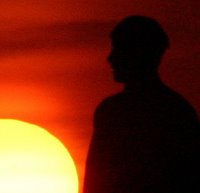Cultivating Loneliness
The following link will take you to an excellent article entitled"Cultivating Loneliness"by Robert Kaplan which was originally published in the Columbia Jounalism Review.
I first found the piece through Rolf Potts.
Kaplan argues that journalists often fail to get at the heart of a story in their rush to meet deadlines and come up with a snazzy headline, whereas travel writers are able to take the time to understand what's really going on, as Emma Larkin did in Finding George Orwell in Burma, which I reviewed yesterday.
This point seems obvious, but is an important thing to keep in mind when traveling, reading and writing.
Kaplan addresses what I was trying to say in earlier posts about the importance of looking for The Silent Language, the collection of common knowledge that defines a community and is utterly inaccessible to a casual visitor.
Here is the opening to Kaplan's article:
"Knowing the future is easy, if only we were willing to see the present. In the 1980s, it was one thing to learn about Afghanistan through fleeting and sporadic news reports; it was another to watch with a relative handful of journalists as Soviet planes and land mines killed ten times more Afghans than all the people killed in Lebanon — a war with which the major news organizations were then obsessed. It was one thing to watch CNN live as the Berlin Wall fell; it was another to hear about it in the then-Yugoslavia, a few hours after watching Albanians throw bottles at Serbian police. It was one thing to hear from academics in the early 1990s about post-cold-war Africa’s encouraging prospects; it was another to spend a day in Conakry, Guinea, searching for a photocopy machine that worked. The most dangerous thing a writer can do sometimes is to describe what he sees in front of his face, for the very ideals and assumptions that many of us live by are dependent upon maintaining a comfortable distance from the evidence."
I first found the piece through Rolf Potts.
Kaplan argues that journalists often fail to get at the heart of a story in their rush to meet deadlines and come up with a snazzy headline, whereas travel writers are able to take the time to understand what's really going on, as Emma Larkin did in Finding George Orwell in Burma, which I reviewed yesterday.
This point seems obvious, but is an important thing to keep in mind when traveling, reading and writing.
Kaplan addresses what I was trying to say in earlier posts about the importance of looking for The Silent Language, the collection of common knowledge that defines a community and is utterly inaccessible to a casual visitor.
Here is the opening to Kaplan's article:
"Knowing the future is easy, if only we were willing to see the present. In the 1980s, it was one thing to learn about Afghanistan through fleeting and sporadic news reports; it was another to watch with a relative handful of journalists as Soviet planes and land mines killed ten times more Afghans than all the people killed in Lebanon — a war with which the major news organizations were then obsessed. It was one thing to watch CNN live as the Berlin Wall fell; it was another to hear about it in the then-Yugoslavia, a few hours after watching Albanians throw bottles at Serbian police. It was one thing to hear from academics in the early 1990s about post-cold-war Africa’s encouraging prospects; it was another to spend a day in Conakry, Guinea, searching for a photocopy machine that worked. The most dangerous thing a writer can do sometimes is to describe what he sees in front of his face, for the very ideals and assumptions that many of us live by are dependent upon maintaining a comfortable distance from the evidence."


1 Comments:
Not sure I'll be able to get "Orwell" that book where I am now. I'll look for it when I get back to Japan. Probably toolate then but whatever.....
Post a Comment
Subscribe to Post Comments [Atom]
<< Home